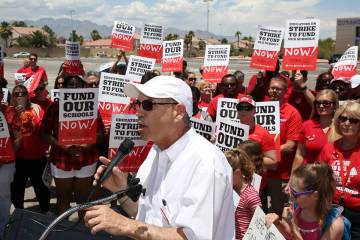EDITORIAL: How collective bargaining allows fired government employees keep their jobs
It’s easy to see why government unions support arbitration for disciplinary manners. It’s much less obvious why the public should put up with it.
The Review-Journal’s Art Kane recently dug into what happens to fired public employees. The cases included a police officer using excessive force and a school nurse’s assistant giving diabetic children improper treatment.
Their supervisors deemed these offenses worthy of termination. Some of these decisions were reversed, however, often with back pay costing taxpayers tens of thousands of dollars. That’s because union contracts give unelected, unaccountable arbitrators final say on personnel matters.
For instance, the Metropolitan Police Department fired Detective Benjamin Rose in 2015 after a video showed Rose using what appeared to be excessive force during an arrest. Metro’s investigation found that Rose dishonestly claimed the suspect was trying to break away to justify his actions. Rose appealed his termination.
His case ended up in front of arbitrator Kathryn Whalen, who practiced law in Oregon for 15 years. She overruled the department and gave Rose a 40-hour suspension instead. After he was put back on the force, Metro had to pay Rose almost $50,000.
Another case involved a first-aid safety assistant who worked for the Clark County School District. She received her pink slip in 2018 after miscalculating how many carbohydrates diabetic students needed. The district claimed she lied about whether or not she notified a student’s mom about her child’s medical needs.
In stepped arbitrator Mark Burstein. He overruled her firing and gave her a six-month suspension instead.
This process makes little sense. But it’s what happens when government cedes its authority to employee unions through collective bargaining. Nevada governments have done so at the local level for decades. Now the state is in on the game. After he won election, Gov. Steve Sisolak signed a bill allowing state workers to bargain collectively, too. It will now become much more difficult to dismiss incompetent state employees.
Union contracts contain certain procedures that must be followed in order to fire an employee. In some cases, government workers were reinstated over technicalities, such as not receiving proper notice of an investigation.
Private-sector employees have no such protections in many cases. If they seek to contest a termination or other workplace dispute, they may decide to take civil action, which discourages frivolous complaints. The arbitration system for government workers does the opposite and benefits irresponsible and reckless government employees at the expense of those who pay the bills.
Union officials like it, however, because it increases job security and keeps members on the union roles. Democrat politicians — and even some Republicans — often have a vested interest in preserving the status quo because they’re rewarded with hefty campaign contributions.
It’s the taxpayers who are getting ripped off.
To make matters worse, the process is shrouded in secrecy with arbitration hearings conducted in private under the catch-all shroud of a “personnel matter.” In fact, taxpayers have a right to information regarding the performance of those they pay to conduct government business. “It’s a disservice shielding government behavior and government performance — we need to know this stuff,” said Richard Karpel, executive director of the Nevada Press Association.
Union officials like to claim that politicians should do a better job negotiating. But they’re often responsible for electing the very people they end up “negotiating” against.
No less a progressive stalwart than FDR proclaimed that “the process of collective bargaining, as usually understood, cannot be transplanted into the public service” because it would empower public-sector workers to bring about “the paralysis of government by those who have sworn to support it,” which he called “unthinkable and intolerable.”
Mr. Kane’s probe into terminated public employees confirms such fears. Collective bargaining for public employees is a fundamentally flawed proposition and runs counter to the public interest.




























